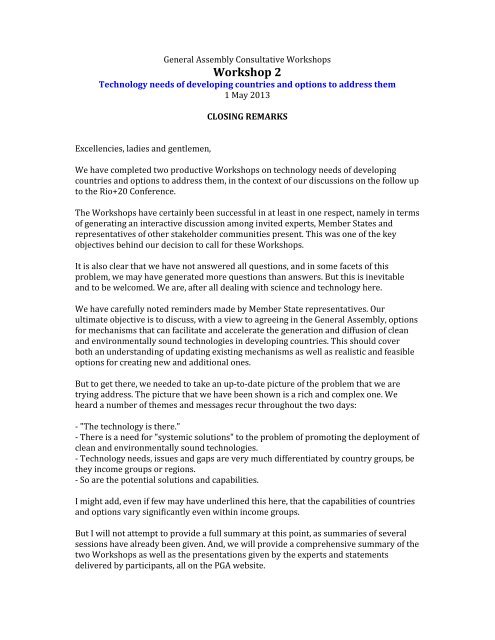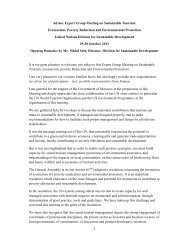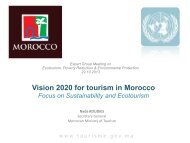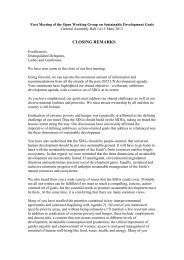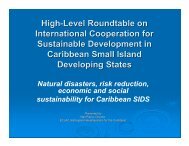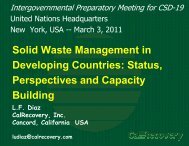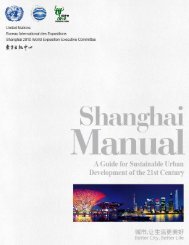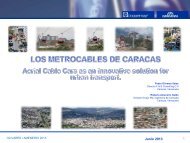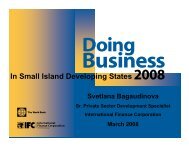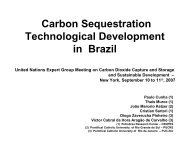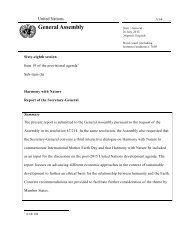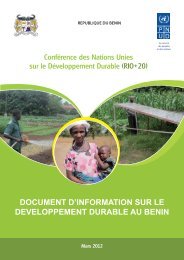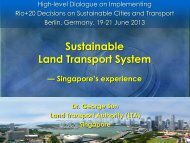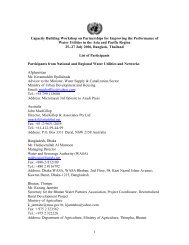Workshop 2 Closing Remarks by the Acting President of the General ...
Workshop 2 Closing Remarks by the Acting President of the General ...
Workshop 2 Closing Remarks by the Acting President of the General ...
Create successful ePaper yourself
Turn your PDF publications into a flip-book with our unique Google optimized e-Paper software.
<strong>General</strong> Assembly Consultative <strong>Workshop</strong>s<br />
<strong>Workshop</strong> 2<br />
Technology needs <strong>of</strong> developing countries and options to address <strong>the</strong>m<br />
1 May 2013<br />
CLOSING REMARKS<br />
Excellencies, ladies and gentlemen,<br />
We have completed two productive <strong>Workshop</strong>s on technology needs <strong>of</strong> developing<br />
countries and options to address <strong>the</strong>m, in <strong>the</strong> context <strong>of</strong> our discussions on <strong>the</strong> follow up<br />
to <strong>the</strong> Rio+20 Conference.<br />
The <strong>Workshop</strong>s have certainly been successful in at least in one respect, namely in terms<br />
<strong>of</strong> generating an interactive discussion among invited experts, Member States and<br />
representatives <strong>of</strong> o<strong>the</strong>r stakeholder communities present. This was one <strong>of</strong> <strong>the</strong> key<br />
objectives behind our decision to call for <strong>the</strong>se <strong>Workshop</strong>s.<br />
It is also clear that we have not answered all questions, and in some facets <strong>of</strong> this<br />
problem, we may have generated more questions than answers. But this is inevitable<br />
and to be welcomed. We are, after all dealing with science and technology here.<br />
We have carefully noted reminders made <strong>by</strong> Member State representatives. Our<br />
ultimate objective is to discuss, with a view to agreeing in <strong>the</strong> <strong>General</strong> Assembly, options<br />
for mechanisms that can facilitate and accelerate <strong>the</strong> generation and diffusion <strong>of</strong> clean<br />
and environmentally sound technologies in developing countries. This should cover<br />
both an understanding <strong>of</strong> updating existing mechanisms as well as realistic and feasible<br />
options for creating new and additional ones.<br />
But to get <strong>the</strong>re, we needed to take an up-to-date picture <strong>of</strong> <strong>the</strong> problem that we are<br />
trying address. The picture that we have been shown is a rich and complex one. We<br />
heard a number <strong>of</strong> <strong>the</strong>mes and messages recur throughout <strong>the</strong> two days:<br />
- "The technology is <strong>the</strong>re."<br />
- There is a need for "systemic solutions" to <strong>the</strong> problem <strong>of</strong> promoting <strong>the</strong> deployment <strong>of</strong><br />
clean and environmentally sound technologies.<br />
- Technology needs, issues and gaps are very much differentiated <strong>by</strong> country groups, be<br />
<strong>the</strong>y income groups or regions.<br />
- So are <strong>the</strong> potential solutions and capabilities.<br />
I might add, even if few may have underlined this here, that <strong>the</strong> capabilities <strong>of</strong> countries<br />
and options vary significantly even within income groups.<br />
But I will not attempt to provide a full summary at this point, as summaries <strong>of</strong> several<br />
sessions have already been given. And, we will provide a comprehensive summary <strong>of</strong> <strong>the</strong><br />
two <strong>Workshop</strong>s as well as <strong>the</strong> presentations given <strong>by</strong> <strong>the</strong> experts and statements<br />
delivered <strong>by</strong> participants, all on <strong>the</strong> PGA website.
The Secretariat will also be sending out a short set <strong>of</strong> questions to solicit views <strong>of</strong><br />
Member States and o<strong>the</strong>r stakeholders that can <strong>the</strong>n be taken into account as <strong>the</strong><br />
Secretary-<strong>General</strong> prepares his report to <strong>the</strong> next <strong>General</strong> Assembly.<br />
This is just <strong>the</strong> end <strong>of</strong> <strong>the</strong> beginning. The first two <strong>Workshop</strong>s have given us ample food<br />
for thought to take into account for <strong>the</strong> next phase. We can now look forward to <strong>the</strong><br />
upcoming <strong>Workshop</strong>s 3 and 4 to be held on 30 and 31 May also here in <strong>the</strong><br />
Headquarters.<br />
In <strong>Workshop</strong> 3 we will seek to identify what are <strong>the</strong> most promising opportunities<br />
<strong>of</strong>fered <strong>by</strong> existing international institutions and programs to facilitate research and<br />
development cooperation, as well as more rapid and widespread global transfer and<br />
diffusion <strong>of</strong> environmentally sound technologies.<br />
On this, <strong>the</strong>re is no doubt that we need to focus on what more needs to be done at <strong>the</strong><br />
international level. But at <strong>the</strong> same time, we are not starting from zero. We need to take<br />
a careful look at how information, capacity or o<strong>the</strong>r gaps can be addressed and how<br />
existing international arrangements can be fur<strong>the</strong>r enhanced to foster technology<br />
cooperation and transfer.<br />
And, lest anyone think we are trying to avoid <strong>the</strong> issue <strong>of</strong> intellectual property<br />
protection, we intend to allocate a good bit <strong>of</strong> <strong>Workshop</strong> 3 to a thorough discussion <strong>of</strong> it.<br />
Let me also note, however, <strong>the</strong> remarks made <strong>by</strong> several experts yesterday, underlying<br />
that <strong>the</strong> importance <strong>of</strong> IPRs as a barrier to technology uptake and use is very much<br />
differentiated <strong>by</strong> sector or type <strong>of</strong> technology.<br />
Ladies and gentlemen,<br />
With all this behind us <strong>by</strong> <strong>the</strong>n, <strong>the</strong> final <strong>Workshop</strong> should provide an excellent<br />
framework to discuss ways for moving forward in this subject area.<br />
And I do not need to remind anyone here that we are dealing with a very complex and<br />
difficult issue area. Progress has been too slow since Rio 1992 in addressing <strong>the</strong> need to<br />
develop, transfer and diffusing globally technologies for sustainable development. We<br />
must redouble our efforts and also recognize <strong>the</strong> new technology landscape that has<br />
emerged since 1992 and that it presents new cooperation opportunities. Complexity is<br />
not an excuse for inaction. Time is <strong>of</strong> <strong>the</strong> essence.<br />
But I have reason to believe that we have made good progress and a good beginning <strong>the</strong><br />
last two days.<br />
I would like to thank our invited experts and moderators for having stimulated a very<br />
good discussion. And I thank <strong>the</strong> representatives <strong>of</strong> Member States and o<strong>the</strong>r<br />
stakeholder communities present, for having seized upon this chance for a good<br />
interactive discussion.<br />
Watch this space. We will continue down this road. We now take a pause until we<br />
resume this discussion on <strong>the</strong> 30th <strong>of</strong> May.<br />
Thank you.


